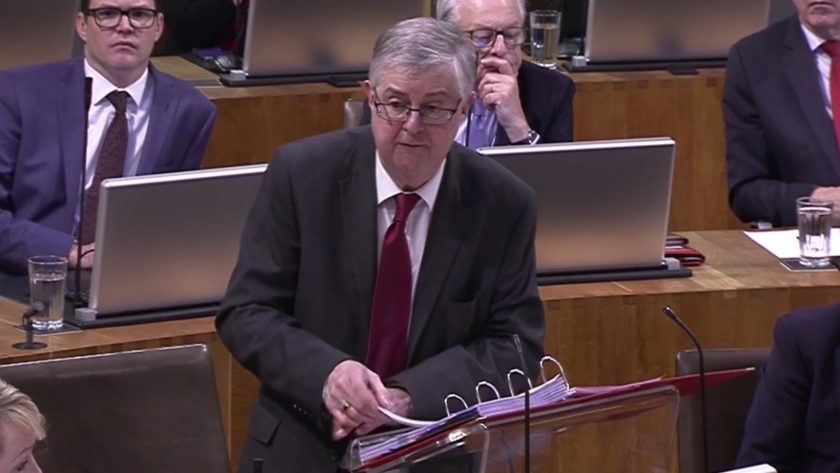First Minister Questions: First Minister concedes A&E performance in the north-east Wales is “unacceptable”

The below is the another in a new quick weekly summary of this week’s First Minister Questions session from Cardiff Bay. First Minister Questions takes place every Tuesday when the Assembly is sitting and can be watched live via Senedd.tv.
For those who have never ventured onto the Senedd site, you can view the session the below was taken from here, that allows a video player (along with creation of your own clips!) plus by clicking the ‘meeting information and papers’ link you are able to view all the supporting documentation, along with a link to the full transcript.
The first topic covers waiting times at the Maelor, something we covered here earlier this week.
A&E waiting times
Plaid Cymru leader, Adam Price AM (Plaid, Carms. E. & Dinefwr), used an evidence session with the Public Accounts Committee on Monday (video clip below) to put the First Minister on the spot regarding waiting times at A&E departments at Ysbyty Glan Clwyd and Wrexham Maelor Hospital
The First Minister said A&E departments saw more patients than ever before during December 2018 and, as a result, even though there was no great improvement in waiting times the NHS was more resilient than previous years. The median time that people in Wales had to wait in A&E was 2 hours 25 minutes.
“….it is unacceptable that people are kept waiting in some places in the way that the Member described, and the performance at the Wrexham Maelor Hospital is not acceptable to the Welsh NHS, it’s not acceptable to the (Health) Minister and not acceptable to the board of Betsi Cadwaladr (Health Board) either. Huge efforts are going on to make sure that the position there is improved for the future.”
– First Minister, Mark Drakeford (Lab, Cardiff West)
“Was this putting lives at risk?” Adam asked, calling for an inquiry into how A&E was working across the whole of Wales.
The First Minister rejected the need for “months and months” of work on another inquiry adding that the NHS know where the pinch points are and know what needed to be done.
Holocaust Memorial Day
Leader of the Opposition, Paul Davies AM (Con, Preseli Pembs.) found it “disturbing” that 5% of the UK adult population don’t believe the Holocaust happened.
“Research from the Antisemitism Policy Trust found that online searches looking for information on the Holocaust being a hoax rise about 30 per cent every year on Holocaust Memorial Day, and antisemitic searches in Wales are higher than in any other part of the United Kingdom….I’m sure you’ll agree with me that awareness and education is the best means of addressing this. Therefore, are you confident that learning about the Holocaust and the consequences of religious or ethnic genocide are given enough emphasis in Wales’s new curriculum?”
– Leader of the Opposition, Paul Davies AM
The First Minister said he found it hard to accept that so many people are in denial about one of the worst occurrences of the previous century noting it was a wider issue than one of government, but he underlined the importance of a Welsh Government-backed programme to send small numbers of young people to Auschwitz who then return and tell the story to others.
Reducing the cost of NHS agency workers
Jenny Rathbone AM (Lab, Cardiff Central) told the chamber that while there was a need to cover absences in the NHS, different health boards had different ways of managing agency staff – and some were doing so much less effectively than others.
Helen Mary Jones AM (Plaid, Mid & West Wales) added that there was a particular problem in retaining nurses due to a lack of flexible working adding that nurses leave the NHS and, ironically, end up working for the agencies doing the same work but costing the NHS much more.
The First Minister said the amount the NHS spent on agency workers was cut by £30million over the last financial year and mooted a national staff bank.
“….some health boards have already made greater progress than others. Cardiff and Vale University Health Board….spends on agency 1.8% of its pay costs as a whole, and that is the lowest percentage of any health board in Wales. The second phase of the work that I mentioned in my opening answer will involve all health boards in Wales learning from one another, but it will also….consider the benefits of an all-Wales staff bank, so that we can use the staff that we have more directly under our employment, in order to bring down costs, but also to provide a better service.”
– First Minister, Mark Drakeford
Keep up to date with what is going on in the Senedd via SeneddHome.com
Spotted something? Got a story? Email: [email protected]
Latest News
